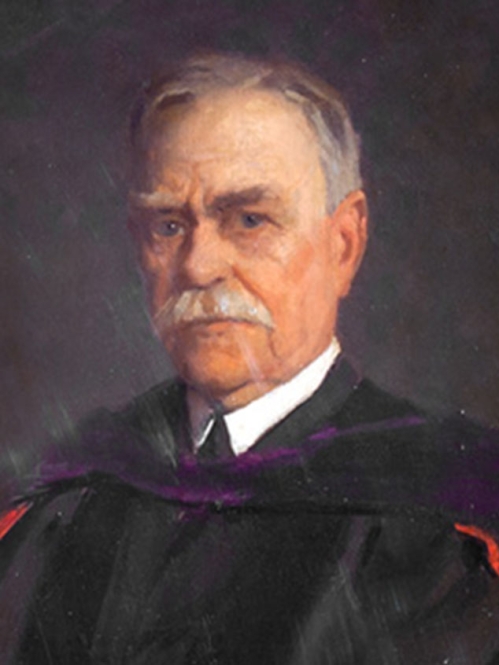Austin Scott
Rutgers' 10th President, 1891 to 1906

Summary
An eminent and influential teacher, Austin Scott (1848–1922) was professor of history, political economy, and constitutional law in Rutgers College when the trustees elected him to succeed Merrill Gates as Rutgers’ 10th president in 1891. He was born in Maumee, near Toledo, Ohio, graduated from Yale College in 1869, and spent a year at the University of Michigan, where in 1870 he received a master of arts degree. He studied for three years at Berlin and Leipzig and received his Ph.D. from the University of Leipzig in 1873, writing his dissertation on “Relations of Macedon to Rome in the War with Carthage.” In Germany, he assisted the famed historian George Bancroft, at that time U.S. minister to Germany, in preparing the 10th volume of History of the United States. He was also charged with the responsibility of carrying dispatches to Washington on the decision of Emperor William as arbitrator between Great Britain and the United States in regard to the Northwestern boundary. On his return to the United States, Scott was a German instructor at the University of Michigan from 1873 to 1875, and then, for seven years, an associate in history at Johns Hopkins University, where he organized a seminar on American history. During this period he continued as assistant to Bancroft, assembling and arranging historical material for his History of the Constitution of the United States. In 1883 he was appointed to the faculty of Rutgers College and served with distinction until his election as the eighth president of the college.
Biography
Scott’s presidency at Rutgers was dominated by the college’s relations with the State of New Jersey. He succeeded in resolving issues relating to the Scholarship Act of 1890, from which Rutgers had failed to receive payment for over a decade. In efforts to serve the state, Rutgers instituted the “short course” and college extension education. The faculty turned their attentions to curriculum reform with the intent on strengthening the classical program. Student life flourished with fraternity life, intercollegiate athletics, debating contests, and new secret honorary societies such as Cap and Skull (1900), Casque and Dagger (1901), and Theta Nu Epsilon (1892). Students experimented for the first time with self-government and formed a committee to regulate student conduct and discipline. Physical training received a boost in the 1890s with a generous gift from Robert F. Ballantine, a wealthy brewer in Newark and college trustee, to construct a gymnasium on the campus. A private gift from Mrs. Ralph Voorhees provided funds for the construction of a library, as the one in Kirkpatrick Chapel had expanded considerably under the care of Irving S. Upson. The Voorhees Library was dedicated on Charter Day, 1904.
Throughout his administration, Scott continued to teach and he wished to return to the classroom. He never enjoyed administrative work and ultimately tendered his resignation as president in 1906 and returned to his professorial duties, instructing in political science—including the constitution, international law, and civics. For 16 years he carried on his teaching and provided generous administrative assistance to his successor as president, William H.S. Demarest. He also took an active interest in the civic affairs of New Brunswick, serving as president and contributor to the New Brunswick Historical Club. In 1912 he was elected mayor of the city and served in that office for three years. He was an elder in the Second Reformed Church and also a member of the Board of Superintendents of the New Brunswick Theological Seminary. Austin Scott died on August 15, 1922, at his home in Granville Centre, Massachusetts.
This biographical sketch was authored by Thomas J. Frusciano, Rutgers University Archivist. It originally appeared in The Journal of the Rutgers University Libraries.